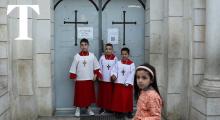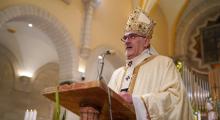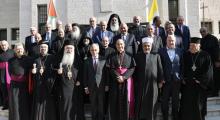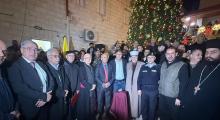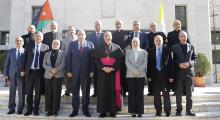Issued by the Catholic Center for Studies and Media - Jordan. Editor-in-chief Fr. Rif'at Bader - موقع أبونا abouna.org
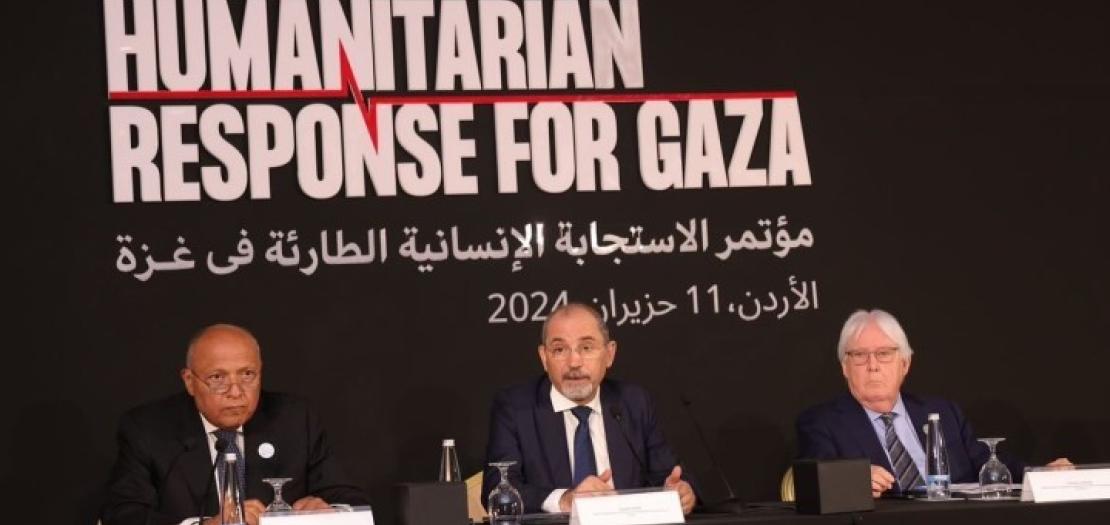
The conference at the King Hussein Ibn Talal Convention Centre at the Dead Sea, seeks to identify ways to bolster the international community’s response to the humanitarian catastrophe in the Gaza Strip.
Mohammad Momani, former media minister, told The Jordan Time that the conference is of “strategic importance as it has the potential of creating political horizons for ending the conflict in Gaza”.
“Jordan is at a very good position to host the conference along with Egypt, given the identical Amman-Cairo view on the war and the required course of action as well as the good relationships the Kingdom enjoys with all parties,” Momani said.
“Jordan and His Majesty King Abdullah enjoy international credibility, which makes the prospects of the conference and the possibility of success highly promising,” Momani, who is also the secretary general of Al Mithaq Al Watani (National Charter) Party, said.
He also expressed hope that the conference will restore some level of confidence and trust for the international community which, he said, “has lost much of its credibility in the last couple of months”.
“The conference represents a multilateral effort that will help Jordan and the international community work collectively to deal with the ongoing crisis in Gaza. Ending the war constitutes a strategic interest of Jordan.”
The veteran politician added that the high-profile gathering sends a good message to the “conflicting parties” that Jordan and the entire world are determined to help end the conflict and create peace and security in the region, with the prospects of reaching a two-state solution.
Political analyst Amer Sabaileh explained that the importance of the conference lies “first and foremost in its timing and in putting Gaza on a fast track under the international umbrella”.
“The high-profile gathering coincides with the conflict now reaching a big stage and that requires collective efforts to formulate a plan for the delivery of humanitarian aid and the rebuilding of Gaza.”
Sabaileh also explained that the conference is something that might be built on later. “Everybody wants to help Gaza, but there is no real coordinated work.”
“Jordan started an initiative of airdrops, everybody is helping now. I think it [the conference] would be a platform for laying down the foundation of a new outlet to help stop the war in Gaza and rescue Gaza after the war,” Sabaileh told The Jordan Times.
He explained that the conference is but a continuation of the Jordanian efforts in ending the war on Gaza and also the long-running Palestinian-Israeli conflict.
“The conference is a reward towards the Jordanian active political efforts to stop the war in Gaza and find solutions.”
The conference aims to outline effective measures and procedures, as well as operational and logistical needs for this purpose, while seeking commitment for a collective coordinated response to address the humanitarian situation in Gaza, the Royal Court said.
The war in Gaza, which erupted on October 7 following Hamas’ unprecedented attack on Israel, is causing extreme suffering for the entire population of over 2.3 million Palestinians across the Strip. People in war-torn Gaza face threat of famine, widespread trauma and suffer from lack of access to food, water, shelter or medicine due to the Israeli blockade on the tiny Palestinian territory.
UN Secretary-General Antonio Guterres has warned that the Gaza Strip was in the midst of an “epic humanitarian catastrophe”, with the World Food Program and other international relief organizations saying that parts of Gaza are now gripped by “a full-blown famine”.
On the other hand, “The Call for Action: Urgent Humanitarian Response for Gaza”, commencing on Tuesday at the King Hussein Bin Talal Convention Center in the Dead Sea area, is jointly organized by Jordan, Egypt, and the United Nations.
The conference, convening at the invitation of His Majesty King Abdullah II, Egyptian President Abdel Fattah El-Sisi, and UN Secretary-General Antonio Guterres, gathers leaders, heads of governments, and heads of international humanitarian and relief organizations.
Its primary objective is to enhance the international community's response to the humanitarian crisis in Gaza, identify effective response mechanisms and steps, address operational and logistical needs, and commit to a unified response to the humanitarian situation.


